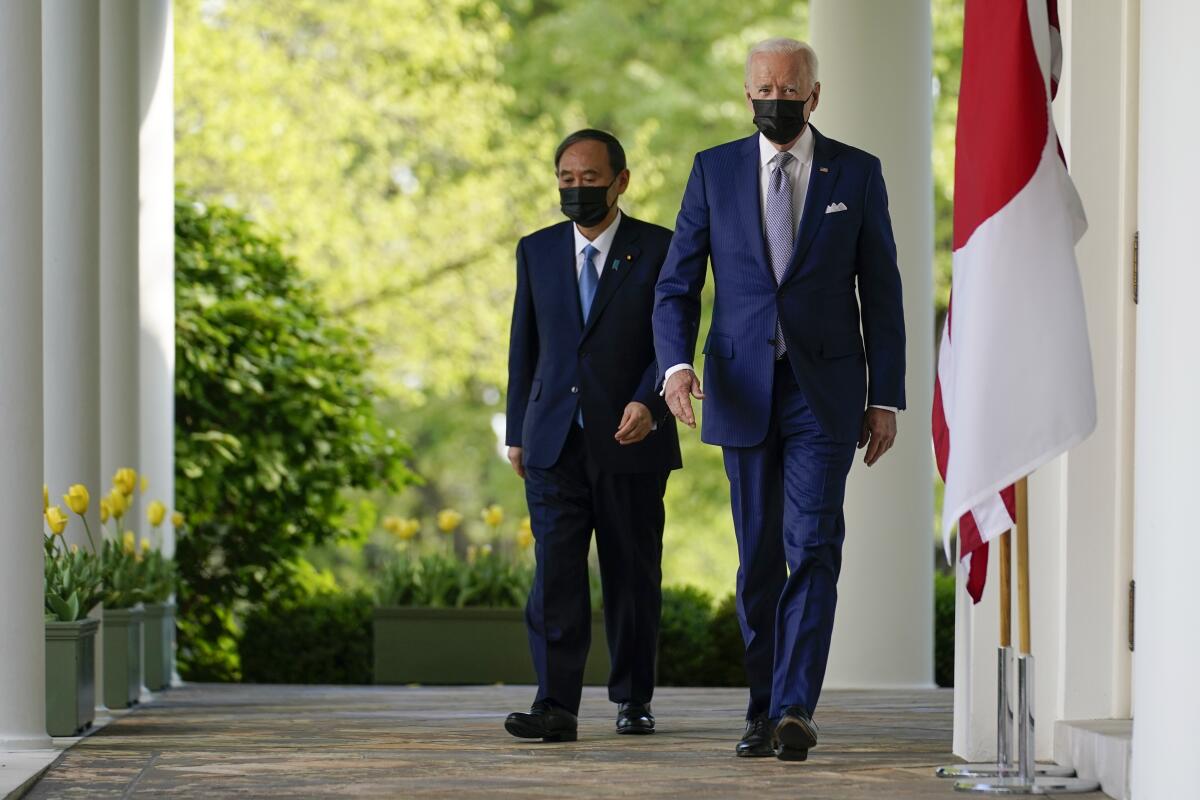Biden and Japan’s prime minister meet, reaffirming their alliance amid China’s rise

- Share via
WASHINGTON — President Biden welcomed Japanese Prime Minister Yoshihide Suga at the White House on Friday, his first face-to-face meeting with a foreign leader and a clear signal to an increasingly aggressive China about the shared commitment to strategic cooperation between the United States and Japan.
“Our cooperation is vital in my view — and I think in both our views — to meeting the challenges that face our nations and ensuring the region remains free and open and prosperous,” Biden said to Suga as reporters briefly were allowed in the room where the leaders met across a long table flanked by top advisors. Suga expressed gratitude for being Biden’s first foreign visitor and condolences for the victims of the deadly shooting overnight at a FedEx plant in Indianapolis.
Biden’s early meeting with Suga, as well as his planned get-together next month with South Korean President Moon Jae-in, another important Pacific Rim ally, reflect the administration’s effort to bolster the United States’ alliances with both countries as a way of countering China’s rising economic and military ambitions, as well as deterring nuclear-armed North Korea.
“The signaling effect of this summit to all of Asia is really important because it shows the U.S. is serious about its strategy in Asia and that it starts with a strong U.S.-Japan alliance,” said Nicholas Szechenyi, deputy director of the Japan Chair at the Center for Strategic and International Studies, a Washington think tank. “The overall message that the summit will send is extremely profound.”
During a news conference in the Rose Garden after their discussions, Biden said that the decision to meet in person amid the pandemic was “indicative of the value and importance we both place on this relationship.”
The two leaders, both just months in office, announced a partnership aimed at improving coordination on the pandemic response and future global health challenges. They also reaffirmed their countries’ support for Taiwan, a rebuke to China’s increasingly threatening behavior toward the island it claims as its own, and announced bilateral agreements to cooperate in developing 5G technology and combating climate change.
Suga said the two leaders agreed, on the matter of China’s expansionist forays into the shipping lanes of the South China Sea, that the United States and Japan “oppose any attempts to change the status quo by force or intimidation.”
Biden said: “We’re committed to defending and advancing our shared values, including human rights and the rule of law. We’re going to work together to prove that democracies can still compete and win in the 21st century.”
Suga, like his predecessor Shinzo Abe, who assiduously courted President Trump to maintain close U.S.-Japan relations, is determined to keep America engaged in the region. During his remarks in the Rose Garden, Suga described the United States as “Japan’s best friend,” and he co-opted Biden’s domestic policy slogan in stating that their nations’ cooperation would enable Asia and the world to “build back better.”
Biden referred to his counterpart as “Yoshi,” as though they were longtime friends.
The president is determined to successfully pull off the foreign policy initiative that his former boss, President Obama, could not — to engineer a “pivot” from the Middle East, where the U.S. has been bogged down militarily for two decades, to pay more attention to the vital Indo-Pacific region. Coincidentally, the meeting with Japan’s leader comes just days after Biden announced a final U.S. withdrawal from Afghanistan by Sept. 11, a shift partly predicated on the desire to focus more on East and South Asia.
Even with their mutual interest in a strong bilateral relationship, Biden and Suga’s long-term diplomatic success is far from assured, given the challenges in the region and the difficulty of containing China, Japan’s largest trading partner.
Japan, which depends on unfettered shipping through the Strait of Taiwan separating China and the island, has urged the U.S. to take a stronger position condemning China’s recent provocative military flights across the waters.
On a subject of intense interest in Japan, Suga affirmed that he intends to move forward with the 2021 Summer Olympic Games in Tokyo, which were originally scheduled for last summer, despite public health risks from coronavirus variants, and said that Biden offered his support. Earlier this week, the White House said Biden had yet to make a decision on whether to send U.S. athletes to compete.
It’s unclear how prominent China’s human rights record was in the two leaders’ talks. The United States has been more forceful than Japan in criticizing Beijing for human rights violations against the mostly Muslim Uyghurs of northwest China and democracy advocates in Hong Kong, reflecting Japan’s reliance on good trading relations with China.
“Managing strategic competition with China is a very delicate balancing act between deterring Chinese aggressive behavior, but also recognizing that Japan and other countries in Asia have close economic ties with China,” said Szechenyi, the Japan expert. “This summit captures the ultimate challenge: How do you balance those two requirements?”
Success, ultimately, may hinge on the two leaders’ personal relationship. Although they didn’t have a formal lunch or dinner as part of their meeting because of COVID-19 considerations, Biden and Suga had a private get-to-know-you session in the Oval Office before their business meeting, without most aides in the room.
Kamala Harris, the first Asian American to serve as vice president, as well as the first Black woman, met privately with Suga in the morning, before his meetings with Biden. During a brief appearance before reporters in Harris’ ceremonial office, both expressed gratitude for the opportunity to meet, with Harris referencing the large Japanese American community in her native California.
More to Read
Get the L.A. Times Politics newsletter
Deeply reported insights into legislation, politics and policy from Sacramento, Washington and beyond. In your inbox twice per week.
You may occasionally receive promotional content from the Los Angeles Times.











